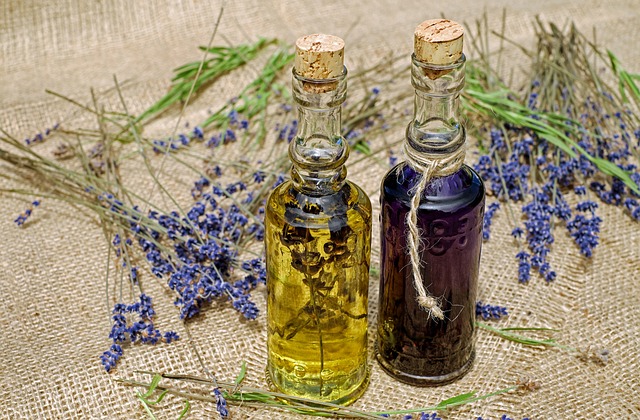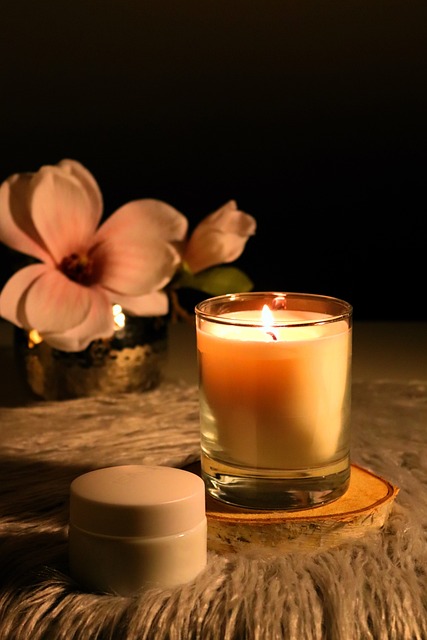Holistic wellness programs enriched with aromatherapy significantly enhance their effectiveness in promoting mental health, managing stress, and balancing overall health. The use of essential oils like lavender and peppermint during mindfulness sessions and yoga practices can heighten relaxation, focus, and mental clarity, while also supporting fitness routines and healthier eating habits through a sensory enrichment approach. Aromatherapy's non-invasive nature makes it an ideal addition to mental health workshops and stress management programs, offering a multisensory experience that complements meditation and yoga, aids in pain and sleep management, and bolsters cognitive function. Its integration into fitness and exercise plans can enhance workout performance and post-exercise muscle relaxation. In nutrition and diet counseling, aromatic elements can influence appetite or cravings, aligning with the comprehensive objectives of wellness programs aimed at a harmonious state of health for both mind and body. This holistic approach leverages the benefits of aromatherapy to create a cohesive toolkit for individuals seeking to manage stress effectively, navigate emotional well-being successfully, and maintain an active, balanced lifestyle.
Embark on a sensory journey that intertwines the art of aromatherapy with your daily wellness practices. This article delves into the transformative role of scents in promoting a harmonious balance between mental clarity and physical vitality. We’ll explore how holistic wellness programs can be enriched by incorporating aromatic therapies, enhancing mindfulness and meditation within mental health workshops, and complementing yoga sessions for a truly rejuvenating experience. Furthermore, we will investigate the calming and invigorating effects of essential oils on stress levels during fitness activities, offering innovative ways to infuse aromatherapy into exercise routines for peak performance and recovery. Additionally, we’ll uncover how aromas can influence nutritional choices and satiety, providing valuable insights for nutrition and diet counseling. Lastly, practical steps will be outlined to seamlessly integrate these scented wellness strategies into your daily life, ensuring a serene atmosphere that supports your overall health objectives. Join us as we traverse the intersection of wellness programs for mind and body, stress management, and holistic living through the power of aromatherapy.
- Harnessing Aromatherapy in Holistic Wellness Programs for a Balanced Mind and Body
- – Explore the integration of aromatic therapies into comprehensive wellness programs, emphasizing the balance between mental and physical health.
- – Discuss how certain scents can enhance mindfulness and meditation practices within mental health workshops.
- – Highlight the role of aromatherapy in complementing yoga for wellness routines.
Harnessing Aromatherapy in Holistic Wellness Programs for a Balanced Mind and Body

Integrating aromatherapy into holistic wellness programs can significantly enhance mental health workshops and stress management initiatives. The soothing scents of lavender and peppermint, for instance, are known to have calming effects, which can be leveraged during mindfulness and meditation sessions to promote a state of relaxation and focus. This practice aligns with the broader objectives of holistic wellness programs that aim to harmonize mental and physical health. Similarly, the use of essential oils can complement yoga for wellness routines, creating an immersive sensory experience that deepens the connection between breath and movement, thereby amplifying the benefits of this ancient practice for overall well-being.
In addition to its application in mindfulness practices, aromatherapy can also be a valuable component of comprehensive wellness programs that include fitness and exercise plans. For example, invigorating scents like lemon or rosemary can stimulate mental clarity and energy levels, supporting individuals in their physical activities and enhancing their performance during workouts. Furthermore, nutrition and diet counseling within these wellness programs can be enriched by incorporating aromatic ingredients that not only influence the sense of smell but also taste, thereby encouraging healthier eating habits and contributing to a balanced mind and body.
– Explore the integration of aromatic therapies into comprehensive wellness programs, emphasizing the balance between mental and physical health.

Incorporating aromatic therapies into comprehensive wellness programs can significantly enhance the balance between mental and physical health. Aromatherapy, with its diverse array of essential oils, offers a non-invasive modality that complements holistic wellness programs. It can be seamlessly integrated into mental health workshops, where the calming scents of lavender or invigorating aromas of peppermint can set the stage for relaxation or concentration. This integration not only supports the psychological aspects of well-being by reducing stress and promoting a sense of tranquility but also contributes to physical health by potentially improving sleep quality and aiding in pain management. When combined with mindfulness and meditation practices, yoga for wellness, and stress management programs, aromatic therapies become a potent tool in a holistic approach to health.
Furthermore, the symbiotic relationship between aromatherapy and holistic wellness is evident when considering fitness and exercise plans. The uplifting scents can energize and motivate individuals during their workouts, while also contributing to post-exercise recovery by aiding muscle relaxation and reducing mental fatigue. In addition to physical activity, nutrition and diet counseling are also enhanced by the inclusion of aromatherapy. Certain essential oils can stimulate appetite or curb cravings, making them valuable allies in maintaining a balanced diet that supports overall well-being. By embracing the full spectrum of wellness—from physical fitness to mental clarity and nutritional balance—individuals can achieve a harmonious state of health through the strategic use of aromatic therapies within their wellness programs.
– Discuss how certain scents can enhance mindfulness and meditation practices within mental health workshops.

Integrating aromatherapy into daily wellness routines can significantly enhance mindfulness and meditation practices within mental health workshops. The calming properties of lavender, for instance, are well-documented and can facilitate a deeper state of relaxation, making it an ideal choice for those seeking to quiet their minds during meditation sessions. Incorporating aromatherapy into holistic wellness programs allows participants to experience a multi-sensory approach to stress reduction, complementing the mental health workshops’ objectives. This synergy between scent and mindfulness not only promotes a sense of tranquility but also supports cognitive functions, aiding in concentration and focus, which are crucial for effective meditation.
Furthermore, the use of essential oils like peppermint can invigorate and energize individuals during yoga for wellness sessions, enhancing their physical practice while promoting mental clarity. A holistic wellness program that includes aromatherapy can thus provide a comprehensive approach to stress management programs, offering participants tools to navigate emotional and psychological challenges effectively. By infusing the environment with intentional scents, these workshops offer a more immersive experience, aligning with the principles of fitness and exercise plans that emphasize both physical and mental health. Nutrition and diet counseling can further complement this holistic approach by ensuring that participants’ diets support their wellness goals, creating a cohesive and integrative system for achieving overall health and well-being.
– Highlight the role of aromatherapy in complementing yoga for wellness routines.

Incorporating aromatherapy into daily wellness routines can significantly enhance the benefits of holistic wellness programs, particularly when combined with practices like yoga. The calming scents of lavender or invigorating aroma of peppermint can complement the physical and mental health workshops that are part of a comprehensive wellness program for mind and body. When practicing yoga for wellness, the strategic use of essential oils can heighten the meditative state, fostering greater mindfulness and meditation. This synergy not only promotes relaxation but also supports the individual’s ability to manage stress more effectively, an essential component of any stress management program. The integration of aromatherapy within fitness and exercise plans can also amplify the overall experience, leading to a more harmonious balance between mental clarity and physical well-being.
Furthermore, nutrition and diet counseling within wellness programs can benefit from the inclusion of aromatic interventions that encourage healthy eating habits by enhancing the sensory perception of food flavors. Aromatherapy can support these programs by helping to regulate emotions and reduce cravings for unhealthy foods, thereby aligning with the individual’s dietary goals. By embracing a holistic approach that includes the senses of smell and taste, wellness routines become more immersive and effective, offering a comprehensive strategy for those seeking to improve their overall health and well-being.
Incorporating aromatherapy into daily wellness routines offers a sensory gateway to enhancing holistic wellness programs for both the mind and body. This article has underscored the potential of fragrant oils and their ability to elevate mental health workshops, yoga sessions, and overall fitness and exercise plans. By thoughtfully integrating aromatic therapies with existing stress management programs and mindfulness and meditation practices, individuals can experience a more profound sense of balance and well-being. As nutrition and diet counseling play a pivotal role in wellness, the addition of tailored scents to stimulate the senses complements these efforts for a comprehensive approach to health. In embracing the therapeutic benefits of aromatherapy, individuals can cultivate a harmonious connection between their physical and mental states, leading to an enhanced quality of life.
